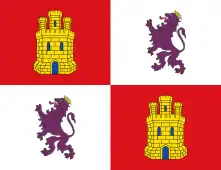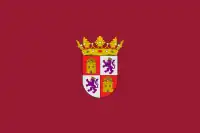 | |
| Use | Civil and state flag |
|---|---|
| Proportion | 10:13[1] |
| Adopted | 1983 |
The flag of Castile and León is the official flag of the Spanish autonomous community of Castile and León. It consists of the quartered coats of arms of Castile, represented by a castle, and León, represented by a lion.

This flag is used to represent the two cultural identities who share this administrative region, the Castle for Castile, and the Lion for León.
The lion design is attributed to Alfonso VII of León,[2] who became king of León and Castile in 1126. The castle symbol is attributed to his grandson Alfonso VIII of Castile,[2] In 1230, Ferdinand III of Castile united the two kingdoms in the Crown of Castile (1230–1715) and quartered the arms as a symbol of the union.[2]
Three centuries of Spanish presence on the American continents left a consistent footprint. In many areas of the Southern United States, for example, symbols of Spanish ancestry are preserved in the coat of arms or symbols of states and cities. Several cities, like Los Angeles, California and St. Augustine, Florida, incorporate the signs of the Kingdom of Castile on their shields or flags. In displays of the six flags that have flown over Texas, also flown in St. Augustine, Florida and Louisiana, Spain is usually represented by the flag of Castile and León.
Evolution and variations
Historic Royal Standard
.svg.png.webp) Royal Standard of the Crown of Castile – Early Style
Royal Standard of the Crown of Castile – Early Style-Variant.svg.png.webp) 14th Century Style
14th Century Style.svg.png.webp) 15th Century Style
15th Century Style-Variant.svg.png.webp) 15th Century Style – Variant
15th Century Style – Variant.svg.png.webp) House of Habsburg Rule Style (16th–17th Centuries)
House of Habsburg Rule Style (16th–17th Centuries)-Variant.svg.png.webp) House of Habsburg Rule Style – Variant
House of Habsburg Rule Style – Variant
Current flags and emblems

 Regional Government of Castile and León Ceremonial Standard.
Regional Government of Castile and León Ceremonial Standard.
See also
References
- ↑ "Castile and León (Spain)". FOTW.net. Accessed January 26, 2008.
- 1 2 3 Flag, emblem and coat of arms. Junta de Castilla y León website. Accessed January 26, 2008.